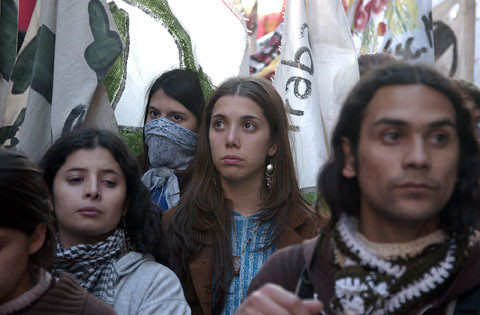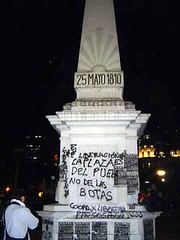Saturday, 16 September, is the 30th anniversay of La Noche de los Lápiches (The Night of the Pencils), another sad but notable event from the most recent dictatorship in Argentina. Last year I wrote extensively about the march that took place on the 29th anniversary.
Since it’s the 30th anniversary there should be an equally large gathering. On the radio this morning I heard about a march planned for Friday evening at 6pm from Facultad to Plaza de Mayo. Today there is also a teachers strike at the University of Buenos Aires. I won’t be covering the march this year since I’ve made prior plans to hear a friend sing Celtic music.
Last year’s march was one of the largest that I saw in 2005. But last year there also was more tension between the piquetero groups and the police. Last year’s Night of the Pencils march was just one week after a very tense confrontation between piqueteros and police at the intersection of Av de Mayo and Av 9 de Julio. That march was originally planned to be an anti-Bush protest in anticipation of Bush’s visit to the summit in Mar del Plata. A large number of students were mixed in with the piquetero groups but the whole thing turned ugly when the police blocked Av de Mayo and pulled up the truck with the water cannon. It eventually ended in a few hardcore piqueteros throwing stones at the police while the other marchers walked away.
So, the following week on the 29th anniversary of the Night of the Pencils the turnout was enormous. The marchers made it to the plaza where I watched a number of young people (not piqueteros) paint graffiti on the monument in the middle of Plaza de Mayo.
The monument was quickly repainted by the next morning. Tonight’s march should be interesting but not as exciting as last year. I don’t know if there are any commemorative activities planned for Saturday, the actual anniversary. (People here seem to like to march on Fridays).
As disturbing as history
Ok, I’ve not been keeping up with the news the last few days, via Clarin I just learned about a controversial entry in the Spanish version of Wikipedia about la Noche de los Lápiches.
The entry has been updated but see this link for an older version of the entry on La Noche de los Lápiches that claims la noche de los lápices was invented by terrorist organizations and that the seven youths who were kidnapped by the government on 16 September 1976 were actually terrorists. What is disturbing is that this viewpoint that the military government of 1976-1983 was in a struggle against terrorism is still accepted among certain parts of Argentine society. Admittedly, Argentina during the 1960s-1970s is a very complicated history – one that everyone needs to reflect upon.


July 5th, 2009 at 11:35 am
I left Bs.As. in 1970 but at the time i remember the communist youth beign very active, armed and well organized. I was involved in politics on the Peronist youth. Many times we were confronted by these groups and they meant bussiness. Most of us were kind of naive concerning violence while them had no trouble using it. Their groups were all young, with an older guy in charge, these groups were not as numerous as ours but they were well organized. Usually one group didn’t know the other groups in the area (in case of capture nobody knew the names of the others). I stood face to face with them and they were scary. Most argentines feel they got what they deserved.
September 14th, 2010 at 8:33 pm
“What is disturbing is that this viewpoint that the military government of 1976-1983 was in a struggle against terrorism is still accepted among certain parts of Argentine society.”
That you phrase the issue in that manner shows that you don’t know what you are talking about, or if you do, are deliberately obfuscating the issue.
Most of the terrorism during the 1970s occurred during the democratically elected Peron governments.Had there been no terrorism, the milicos would never have taken over in March 1976. Do you realize that even Jacobo Timmerman supported the March 1976 coup? Yes, that Jacobo Timmerman. If you don’t believe me, read his book. It’s in both Spanish and in English.
By 1978,most of the terrorists/Montoneros had been killed off, along with thousands of innocents. The latter pars of the Junta years were fairly quiet.